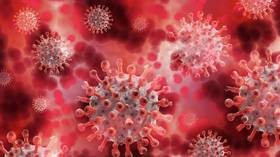Research strongly suggests Covid-19 virus enters the brain & may be an autoimmune disease

A new study by Yale University has found that critical Covid-19 patients disproportionately possess so-called ‘autoantibodies’ that weaponize their immune systems against them, making their condition far worse.
Researchers used an advanced screening technique on 170 hospitalized patients to detect “autoantibodies” that inflict collateral damage on the patient by attacking their own organs and immune system as opposed to targeting the virus.
They compared the antibodies to those who had milder or asymptomatic infections, as well as those who had not been infected.
Also on rt.com July 2020 may have been deadliest month ever for young Americans, including wartimeIn the hospitalized Covid-19 patients, they found autoantibodies – such as interferons, natural killer cells, and T cells – that could disrupt the work of the body’s frontline immune system troops, which had essentially been made to defect to the enemy, on the viral side.
The presence of autoantibodies was repeatedly detected in the most critical Covid-19 patients, and tests on mice indicated that the autoantibodies likely exacerbated the disease. Unfortunately, the researchers did not find any Covid-19 specific autoantibodies that might alert medical staff to an impending, developing severe case of Covid-19 in patients.
The mystery surrounding the varying severity of the disease remains, but the research suggests that people with pre-existing autoantibodies in their systems are likely at higher risk of a severe bout of Covid-19.
Also on rt.com Scientists identify 8 specific genetic variants linked with severe Covid-19 infection in possible life-saving breakthroughThe research, which has yet to be peer reviewed, supports the idea that, for some unfortunate patients at least, Covid-19 could well be considered an autoimmune disease triggered by the coronavirus.
Several previous studies revealed that patients without a history of autoimmune disease had been found to have developed these autoantibodies after contracting Covid-19. Elsewhere, other research found that patients with severe Covid-19 infections can also develop autoantibodies to interferons – another key component of humans’ ability to fight viral infections.
In an additional study published this week in Nature Neuroscience, the virus’s spike protein was found to be capable of crossing the blood-brain barrier in mice, which suggests the same could well be possible in humans, and might explain some of the worrying cognitive issues associated with severe Covid-19 infection.
Think your friends would be interested? Share this story!















